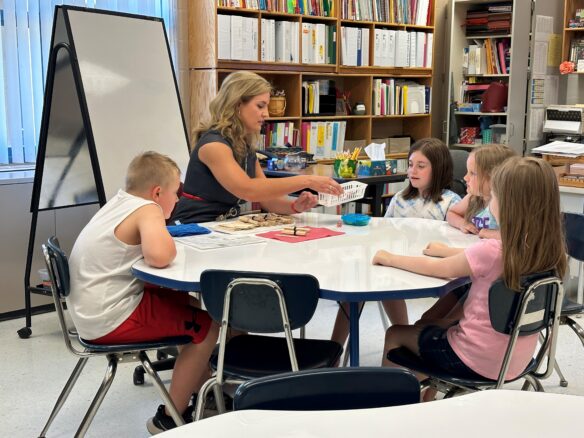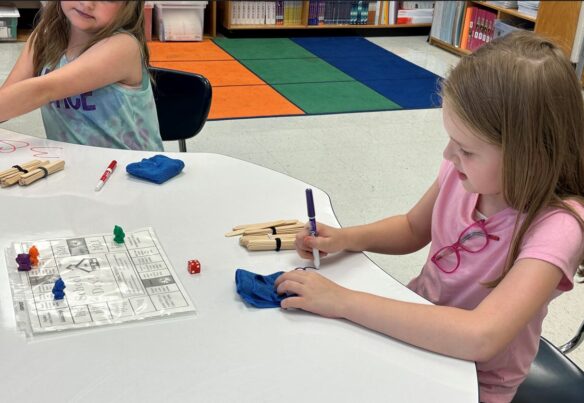
Keisha Wyatt, a math intervention teacher at Oak Grove Elementary School (Whitley County) hands out pieces to a Monopoly-inspired game to four 2nd-grade students during class on May 10, 2023. (Photo by Toni Konz Tatman, Kentucky Department of Education)
CORBIN – Math intervention might not seem like much fun for a 2nd-grader, but an innovative approach in Whitley County has students eager to attend class.
It was toward the end of the school day during the last week of school in mid-May when four 2nd-graders at Oak Grove Elementary School knocked on Keisha Wyatt’s classroom door. The students had been attending the small-group math intervention class each day throughout the school year, and even though they had just been playing outside, they were happy to go back into the classroom.
Wyatt, the school’s math interventionist, was prepared. A Monopoly-inspired math game was on the table, and each of the students picked a different, colorful board game piece. The game’s objective was to get the students comfortable with numbers by adding and subtracting popsicle sticks, which represented the “money” in the game. Each square they landed on had different problems they had to solve.
“Putting [math] in a game setting changes everything,” said Wyatt. “The kids love to come. They are boisterous with their answers and vocal, and I love that. I am trying my best to instill the love of math in each student, while also teaching them different skills they will need to be successful in life.”
Eden Freeman, 7, said she looks forward to coming to Wyatt’s classroom.
“It’s fun and it helps me be better in math,” she said.
The help for these students came from Elementary and Secondary School Emergency Relief (ESSER) funding from the American Rescue Plan (ARP) Act. The money supports the safe and sustained return to in-person learning and expands equity by supporting students who need it, particularly those most impacted by the COVID-19 pandemic.
Whitley County Superintendent John Siler said officials have been using the federal relief money in a variety of ways to benefit the district’s 4,000 students, where roughly 70% qualify for free and reduced-price meals.
“Learning online and in a rural setting where there is not a guarantee of a great internet connection – we have just had so many obstacles associated with the pandemic,” Siler said. “We used some of the money to boost the parking lots of our schools so people could pull up and get on our Wi-Fi so they could download and send in assignments to teachers.”
When students returned to the classrooms, teachers and district officials were able to reassess and determine how they could provide additional support.
“Imagine being a kindergartner and trying to become an eager reader in virtual setting,” Siler said. “And then you come back for 1st grade and you are on a hybrid schedule. We are trying to teach them to become independent readers.
“It was a similar situation in math,” he said. “The foundational skills you learn in kindergarten and 1st grade in math, they are so important. We have to work on getting them caught up so they are not behind in the years to come.”
“Small group reading interventions had previously been established through grants at the elementary school level in Whitley County,” said Deputy Superintendent Paula Rickett. The program was such a success, the district added an intervention program in math when the funding became available, she said.
The students Wyatt works with are selected based on the data from the different assessments the district uses, including the Measures of Academic Progress (MAP) test, which is designed to measure student achievement in the moment and growth over time.

A student plays a Monopoly-inspired math game inside Keisha Wyatt’s classroom at Oak Grove Elementary School on May 10, 2023. (Photo by Toni Konz Tatman, Kentucky Department of Education)
“Looking at the data and everything, we feel that it will benefit our kids in the small group,” said Rickett. “It gives them the opportunity to feel successful.”
Wyatt has been in the classroom for 22 years, with the past two spent as a math interventionist.
In all, Whitley County has seven interventionists working individually with students who need a boost in math instruction. At Oak Grove, Wyatt sees 30 students daily for 45 minutes.
The activities in Wyatt’s class are supported by research and based on the eight Mathematical Practice Standards and on training she received at the Kentucky Center for Mathematics, an organization that ensures Kentucky teachers have access to innovative professional development. Her work also is supported through Math Recovery Add+VantageMR professional development.
“It’s awesome. There is no better feeling. This is why I come to this job and do this every day, to see them grow,” said Wyatt.
Along with the intervention programs, ESSER funding has allowed Whitley County to keep a program going for students who want to continue their education over summer break. The program is six hours a day for four weeks, with personalized educational opportunities including tutoring, enrichment and a field trip.
The money also has paid the salaries of new nurses at Whitley County schools, helping fill gaps the district had in providing for students.
Rickett said the district is looking at ways to continue the math intervention program once the ESSER funding runs out.
“This is something we really want to sustain,” she said. “We hope to find a grant or additional funding to help us do that.”




Leave A Comment